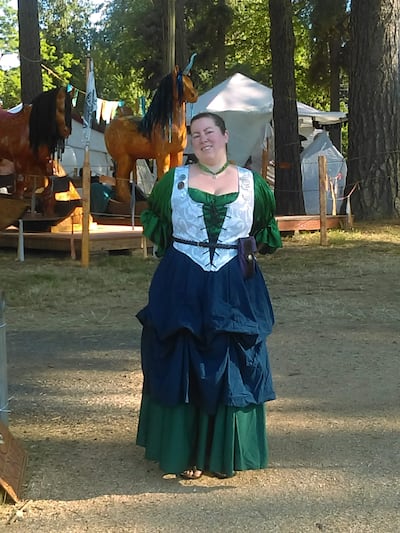For four weekends in June, thousands of people transform the Clackamas County Fairgrounds in Canby into a storybook village called the Vale of Dunrose.
More than 75,000 guests visited the Vale of Dunrose for the Oregon Renaissance Faire this summer, where they chowed down on roasted turkey legs, shopped among 150 merchants selling fantasy-themed wares, watched shows like full-contact jousting and evening fire dances, and posed as the storybook character of their dreams, backed by the two-story castle façade. History buffs, cosplayers and fans of literature, movies and video games all let their geek flags fly freely over the faux-Scottish village.
But Oregon Occupational Safety and Health, Oregon OSHA for short, also visited the Vale of Dunrose this year. What it found there was less than magical: six safety violations, three of them classified as serious.
An OSHA inspector arrived June 30 as employees were packing up the faire the day after festivities ended. The first serious violation was a work platform not firmly secured to a forklift—a $2,118 fine. According to the citation, issued July 24, five or six employees use the forklift’s man basket for hanging ropes and signs and setting up and breaking down the castle. When not properly secured, OSHA writes, “a serious injury is the most reasonably expected outcome…including but not limited to lacerations, broken bones and head injuries.”
The other two serious violations both had to do with heat preparedness. The employer did not have a plan in place for when the heat index exceeded 80 degrees—another $2,118 fine—plus, it did not provide heat illness prevention training to employees. Ren Faire managers should have known their responsibilities for providing water, heat-index information, shade, rest breaks, and access to first aid for employees.
(The less serious violations were not establishing a safety committee; not completing the written hazard assessment for personal protective equipment; and not ensuring that each industrial truck operator had been training certified.)
The Oregon and Washington Renaissance Faires are both run by a company called Wandering in Time Productions. WITP has appealed the three serious citations and has requested an informal conference with Oregon OSHA to negotiate a possible settlement, according to an Aug. 4 document.
Together, the 158 pages of documents on Oregon Renaissance Faire safety, compiled by OSHA and obtained by WW via a public records request, offer an unusually detailed glimpse into the workplace hazards posed by seasonal events, such as concerts and festivals, that provide much of the state’s summer entertainment.
OSHA tends to focus its resources on inspecting high-hazard industries, such as construction, logging and agriculture, and those penalties can run into the low six figures, especially for repeat violators. However, there have been some high-profile mishaps at seasonal events in the past few years. In 2019, two workers were killed at Pickathon Music Festival in Happy Valley when a boom lift tipped over as they dismantled a stage. And in 2024, OSHA fined Cirque du Soleil $8,070 after an aerialist fell during a performance of the show Koozå at the Expo Center, resulting in multiple fractures.
Oregon OSHA spokesman Aaron Corvin would not specify whether seasonal event citations are more or less common than those at other workplaces, saying the agency is more concerned with the work activities at the event, not the nature of the event itself.

The OSHA citation is also the result of a remarkable campaign waged against the Oregon Renaissance Faire by a whistleblower group called The People’s Faire Council. The group has organized on social media, primarily Facebook, and consists of Rennies—faire die-hards who believe the Oregon and Washington Renaissance Faires have been operating unsafe environments for years. Concerns about unsafe working conditions and mistreatment of volunteers at the Washington Midsummer Renaissance Faire were first reported in Seattle Met magazine.
One of the whistleblowers goes by the pseudonym Will Blow and requested anonymity for fear of retaliation. Blow and The People’s Faire Council were the ones who called OSHA to come inspect the Oregon Ren Faire. They did so after two head injuries to workers at the previous year’s event.
“We were truly in fear,” Blow says. “Two girls got injured last year, they got head injuries, which is everything OSHA proved this year—that these sites are unsafe.”
Not so, says Wandering in Time Productions, which emailed WW in response to questions about the OSHA citation.
“The health and safety of our community is our highest priority, and we take all concerns seriously. When issues have occurred in the past, WITP worked directly with the appropriate agencies to resolve them and put corrective measures in place.”
The Oregon Renaissance Faire started in 2016 as a one-weekend community event staffed primarily by volunteers. Many of the same Rennies work or volunteer at both the Washington and Oregon faires, and even travel the Ren Faire circuit to places like Texas, Arizona and California. Pirate-themed and Celtic festivals draw a lot of the same crowd, too.
But the Oregon Ren Faire keeps growing: to two weekends in 2017, three in 2023 and now four in 2025. And with it grew the revenue. The nonprofit arm of the Ren Faire is called the Washington Renaissance Arts & Education Society. According to tax records, WRAES brought in $795,000 in 2016, the year the Oregon faire started. That number had shot up to $4 million by 2023, the most recent year with available figures.
WITP would not tell WW exactly how many volunteers it has versus employees, only that it “is proud to be part of the Pacific Northwest’s cultural fabric, working with nearly 2,000 collaborators.” (Only 38 employees were on site the day after the faire ended, according to the OSHA citation.)
The turkey leg booth alone sells 3,000 to 4,000 turkey legs per weekend at $20 apiece, grossing about $60,000 to $80,000 in revenue, according to Will Blow and The People’s Faire Council. Over the course of the monthlong Oregon faire, that’s at least a quarter-million dollars just in gross turkey leg sales.
“If you’re making all this money, you better damn well be paying your people well and treating them well,” says Shana Casey of The People’s Faire Council and a former marketing employee of WITP. “Otherwise, you wouldn’t have this huge revolt going on right now.”
The two women injured at the 2024 faire were both bartenders, or “tavern wenches” in Ren Faire parlance. On June 8, a 2-by-3-foot sign advertising drink specials, such as the Drunken Sailor and the Tipsy Pixie, fell on Kristina Baumeier’s head and shoulders, according to her and her medical records from urgent care, reviewed by WW. The sign was held to the wall with Velcro strips. Baumeier suffered a mild concussion and was terminated from her job as lead bartender the next day, she says.
On May 28, Cair Wood received a head injury while loading a flatbed truck as part of the “build crew,” bonking her forehead on a table leg while not wearing a hardhat.
“I thought I was fine, and suddenly things went black and I couldn’t remember my birthday,” she says.

Wood went to the emergency room and was diagnosed with a concussion. Three days later, she was terminated for “employee misconduct,” according to a June 4 letter from WITP, for allowing her partner into the women’s showers on site. She tried to file a complaint with Oregon Bureau of Labor & Industries but received a letter in April that BOLI did not have the resources to assist her “due to a large increase and a significant backlog of claims.”
“We welcome concerns raised by employees, vendors, and participants, and we do not take adverse action against anyone for reporting a safety issue or experiencing a workplace injury,” WITP says.
Wood now lives in Wyoming where she cares for her mother and works at a gas station. She still deals with memory issues.
“The joy of my life is gone,” Wood says. “That was my dream career, and it’s just gone.” No other Ren Faires will take her calls post-termination. Similarly, Baumeier has lost all of her Ren Faire friends. “The Rennie rumor mill is strong,” Wood says.
Whether WITP will have to pay the $4,236 in penalties depends on success or failure of its appeal. Moving forward, WITP says it is implementing additional training, strengthening on-site safety protocols, and engaging independent experts to help ensure the highest safety standards.
“Yes, we are really happy this magic happens and thousands of people enjoy it,” says Casey of The People’s Faire Council. “Also, it’s happening on the backs of tons of volunteers, and you don’t see what they’re going through.”

